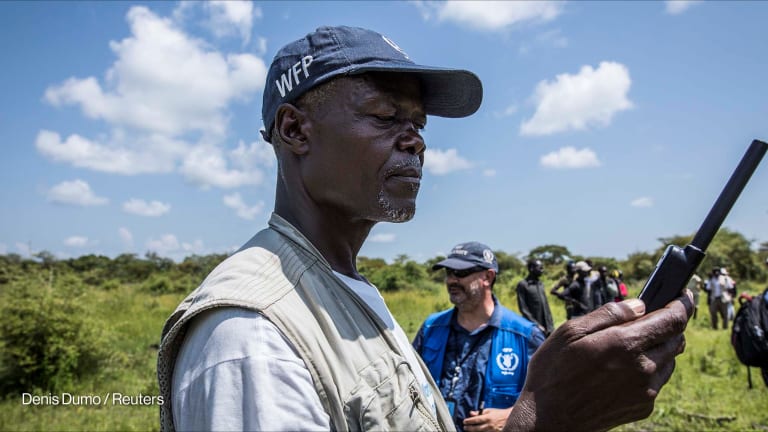
Difficult living conditions, isolation and exposure to high-risk or traumatic situations can all take their toll on the psychological health of aid workers — and many feel they are not getting all the support they need.
While the external pressures of an assignment in the field inevitably heighten susceptibility to stress, they are not the only factors.
“People who go into aid work have a pretty good idea of the kind of environment they will have to face — sometimes they seek it out,” said Alessandra Pigni, an independent psychologist and organizational consultant. “What’s not expected is the kind of organizational environment, which is of very limited support. [It’s a case of:] ‘You’re here to do your job, just get out and do it — and let’s hope you don’t need anything because we can’t provide it!’”
That appears to be backed up by the initial findings of an exploratory survey of humanitarian aid workers conducted by Elon University.
“It seems as if as much chronic stress gets imposed on aid and development workers internally … as from living in harsh conditions, getting shot at, or running from riots,” said one of the researchers behind the poll, an anonymous blogger and aid worker known only as “J.”
Sector at risk?
There is also a prevailing sentiment within the aid sector that admitting to difficulties is a “sign of weakness,” said Brendan Rigby, co-founder of WhyDev, which in 2012-2013 piloted a peer-coaching program in response to the need expressed by some 700 aid professionals to share problems, discuss their work and feel less isolated.
Rigby explained that the psychological impact of aid work remains under-researched, but a growing body of evidence shows that staff members in the field are “at risk of developing significant mental health problems — post-traumatic stress disorder, depression, anxiety and alcohol abuse.”
Adequate care systems are “often underdeveloped and lack attention and resources,” according to the Antares Foundation, which in a study of 5 aid agencies found 30 percent of international staff reporting significant symptoms of post-traumatic stress disorder and over 15 percent reporting dangerous levels of alcohol consumption.
Part of the issue concerns a lack of resources, in a sector tightly constrained by budgets and particularly conscious of personnel costs.
However, the problem is also “an attitude that’s quite ingrained in aid work” — one that Rigby said favors “just getting on with the job,” not least since staff members usually work with people whose suffering is far more serious than their own. His organization’s new initiative, DevPeers, aims to counter that attitude and offer an alternative to more typical — and potentially harmful — coping mechanisms.
Set to launch in July, the scheme will provide a dedicated, online support service combining career guidance, peer mentoring, coaching and psychological support.
More than just policies
Awareness of overall well-being does seem to be gaining ground within a number of aid organizations and agencies. In 2012, for instance, the U.S. Agency for International Development set up a dedicated Staff Care Center to look after the “work-life balance, resilience and wellness” of all employees.
But according to Pigni, such measures may only be a “patch” remedy, intervening on a piecemeal basis when the need arises. Though helpful on a personal level, she said, this “doesn’t really change the dynamics — the culture — of the organization.”
Jonathan Potter, executive director at People in Aid, a United Kingdom-based nonprofit that supports organizational effectiveness, told Devex that many of his organization’s 200-plus members do have health and safety and staff care policies in place. But he cautioned that “supporting humanitarian staff is not just about policies, it is also about management behavior, leadership behavior and individual behavior. These are the kinds of topics we deal with on a day-to-day basis.”
However, according to “J.” — who says he has some 20 years of experience in aid work — despite increasing talk of the issues, “the vast majority of aid organizations have been slow to recognize a) that PTSD and chronic stress are ‘real problems,’ and b) that as employers they have a duty of care to provide follow-up support.”
This seems not only to apply to smaller NGOs. A lack of support is something Pigni has witnessed “across the sector,” while such a large response to WhyDev’s idea for a support network — first pitched in early 2012 — suggested that those employed by larger organizations with bigger budgets and more formalized structures were just as susceptible.
“It’s more about the context you’re in and what support mechanisms you can draw on,” Rigby explained. “Your family and friends can’t relate to what you’re going through, or you don’t want to dump on them.”
Pilot to professional
Rigby, an education specialist from Australia, speaks from personal experience, having spent 2 years with UNICEF in northern Ghana.
“I was quite isolated ... I had a core group of friends, but we did mimic each other in how we dealt with things — we did go out drinking a lot, we did adopt a cynical attitude, we did find it difficult to talk to family and friends.”
That sparked discussions among his WhyDev colleagues — by then also working in developing countries — on the need for an independent support network. It led them to launch a pilot coaching program, taken up by over 300 fellow aid workers.
Unlike the pilot, which set up peer-to-peer partnerships on a voluntary basis, the new DevPeers scheme will be a paid-for service to cover the cost of career coaching and mental health professionals.
This, Rigby explained, would result in a service somewhere between the minimal in-house support offered by employers and the privately-engaged — and more expensive — executive career coach or psychologist.
The exact pricing model is still being refined, but is expected to range from AU$80-200 ($73-183) for a 6-month subscription, depending on the services requested, with the option for organizations to sign up for a number of places for their staff members.
One of the main lessons from the pilot phase was the need to better match participants with coaches, and give users more control over that process — so the new matching process will function a little like a dating website.
DevPeers will also impose more structure on the coaching program, based on feedback from the pilot phase that left it open to participants as to how often they spoke and what subjects they should cover.
“People wanted suggestions for topics to talk about, so that it’s almost like an online course,” said Rigby. “That’s something we’ve taken on board … I think that will help hold people accountable — to us and to their coach or their buddy.”
Realistic expectations
The potential value of a coaching network is underlined by a previous trial among several humanitarian NGOs led by People in Aid.
Designed to complement existing learning and development activities, some of the immediate benefits were an “increase in the level of confidence gained from skills-building and fast-tracking the application and practice of those skills and knowledge,” according to Potter. Coaching also helped participants in their personal responses to stress.
But WhyDev’s peer program has not been without criticism, not least for its specific focus on Western aid workers. International staff members, after all, represent the minority — estimated at somewhere between 3 percent and 10 percent — of the hundreds of thousands of aid workers deployed worldwide.
“Expat aid workers do have particular needs,” said Rigby, “and they are needs that we feel in a position to account for. We can empathize. We don’t assume to know what the needs of [national] aid workers are — that would be a bit presumptuous.”
The program is also limited by reliance on Internet access, with all services delivered online — usually via Skype or email — unless participants are lucky enough to live close enough to coaches to meet face to face.
Participants’ expectations will also need to be realistic, Rigby said, and a clear awareness of the risks needs to be set out.
“It’s not about giving advice … we really stress that,” he said. Instead, coaches are tasked with asking questions and “active listening,” rather than becoming involved in a way that might ultimately aggravate the problem.
“The real risk is that these conversations could bring up traumatic events that do require professional psychological support,” admitted Rigby. But, he added: “that’s why we want to work with professional services.”
In the long term, more substantial research will be needed to understand the specific needs of aid workers and to help prevent and treat problems.
And while Pigni welcomed the idea as being helpful to individuals, she sees it only as part of the solution. Organizations will need to become more aware that “duty of care for staff is a duty of care for the people they’re working with,” she said. “One of the most precious things we can give to people who are suffering is a healthy presence.”
In the meantime, DevPeers hopes at least to break some of the stigma associated with the issue.
“The first thing you’ve got to do is get people talking openly at the grassroots level — the aid workers themselves … and make sure they don’t feel like they’re going to lose face by doing so.”
We want to hear from you — the aid worker community — on some of the issues raised in this piece. Is asking for help seen as a sign of weakness among your peers? How have you coped with periods of pressure during overseas aid assignments? Are sending agencies doing enough to support their staff members? If not, what more should they be doing? Have your say by commenting below, joining our LinkedIn discussion or sending an email to news@devex.com.








